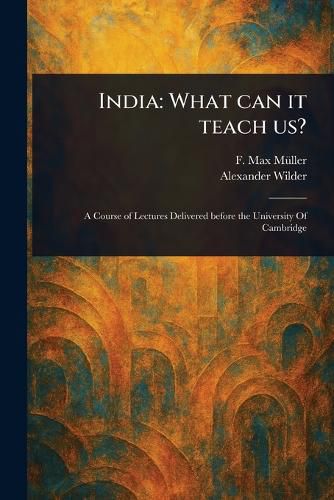Readings Newsletter
Become a Readings Member to make your shopping experience even easier.
Sign in or sign up for free!
You’re not far away from qualifying for FREE standard shipping within Australia
You’ve qualified for FREE standard shipping within Australia
The cart is loading…






This title is printed to order. This book may have been self-published. If so, we cannot guarantee the quality of the content. In the main most books will have gone through the editing process however some may not. We therefore suggest that you be aware of this before ordering this book. If in doubt check either the author or publisher’s details as we are unable to accept any returns unless they are faulty. Please contact us if you have any questions.
Explore the rich tapestry of Indian culture and philosophy with "India: What can it teach us?", a series of lectures delivered by F. Max Muller at the University of Cambridge. This meticulously prepared print edition delves into the heart of Hinduism and the Vedas, offering insights into the historical and social significance of India.
Muller, a renowned scholar, examines the profound wisdom embedded within ancient Indian texts, providing a comprehensive overview of their impact on Indian society. Discover the enduring principles and timeless lessons that have shaped Indian thought for centuries. This book explores the foundations of Indian history and its continued relevance for understanding the world around us. Journey through the core tenets of Hinduism and gain a deeper appreciation for the cultural significance of the Vedas. A valuable resource for anyone interested in history, religion, and the social sciences.
This work has been selected by scholars as being culturally important, and is part of the knowledge base of civilization as we know it.
This work is in the public domain in the United States of America, and possibly other nations. Within the United States, you may freely copy and distribute this work, as no entity (individual or corporate) has a copyright on the body of the work.
Scholars believe, and we concur, that this work is important enough to be preserved, reproduced, and made generally available to the public. We appreciate your support of the preservation process, and thank you for being an important part of keeping this knowledge alive and relevant.
$9.00 standard shipping within Australia
FREE standard shipping within Australia for orders over $100.00
Express & International shipping calculated at checkout
This title is printed to order. This book may have been self-published. If so, we cannot guarantee the quality of the content. In the main most books will have gone through the editing process however some may not. We therefore suggest that you be aware of this before ordering this book. If in doubt check either the author or publisher’s details as we are unable to accept any returns unless they are faulty. Please contact us if you have any questions.
Explore the rich tapestry of Indian culture and philosophy with "India: What can it teach us?", a series of lectures delivered by F. Max Muller at the University of Cambridge. This meticulously prepared print edition delves into the heart of Hinduism and the Vedas, offering insights into the historical and social significance of India.
Muller, a renowned scholar, examines the profound wisdom embedded within ancient Indian texts, providing a comprehensive overview of their impact on Indian society. Discover the enduring principles and timeless lessons that have shaped Indian thought for centuries. This book explores the foundations of Indian history and its continued relevance for understanding the world around us. Journey through the core tenets of Hinduism and gain a deeper appreciation for the cultural significance of the Vedas. A valuable resource for anyone interested in history, religion, and the social sciences.
This work has been selected by scholars as being culturally important, and is part of the knowledge base of civilization as we know it.
This work is in the public domain in the United States of America, and possibly other nations. Within the United States, you may freely copy and distribute this work, as no entity (individual or corporate) has a copyright on the body of the work.
Scholars believe, and we concur, that this work is important enough to be preserved, reproduced, and made generally available to the public. We appreciate your support of the preservation process, and thank you for being an important part of keeping this knowledge alive and relevant.